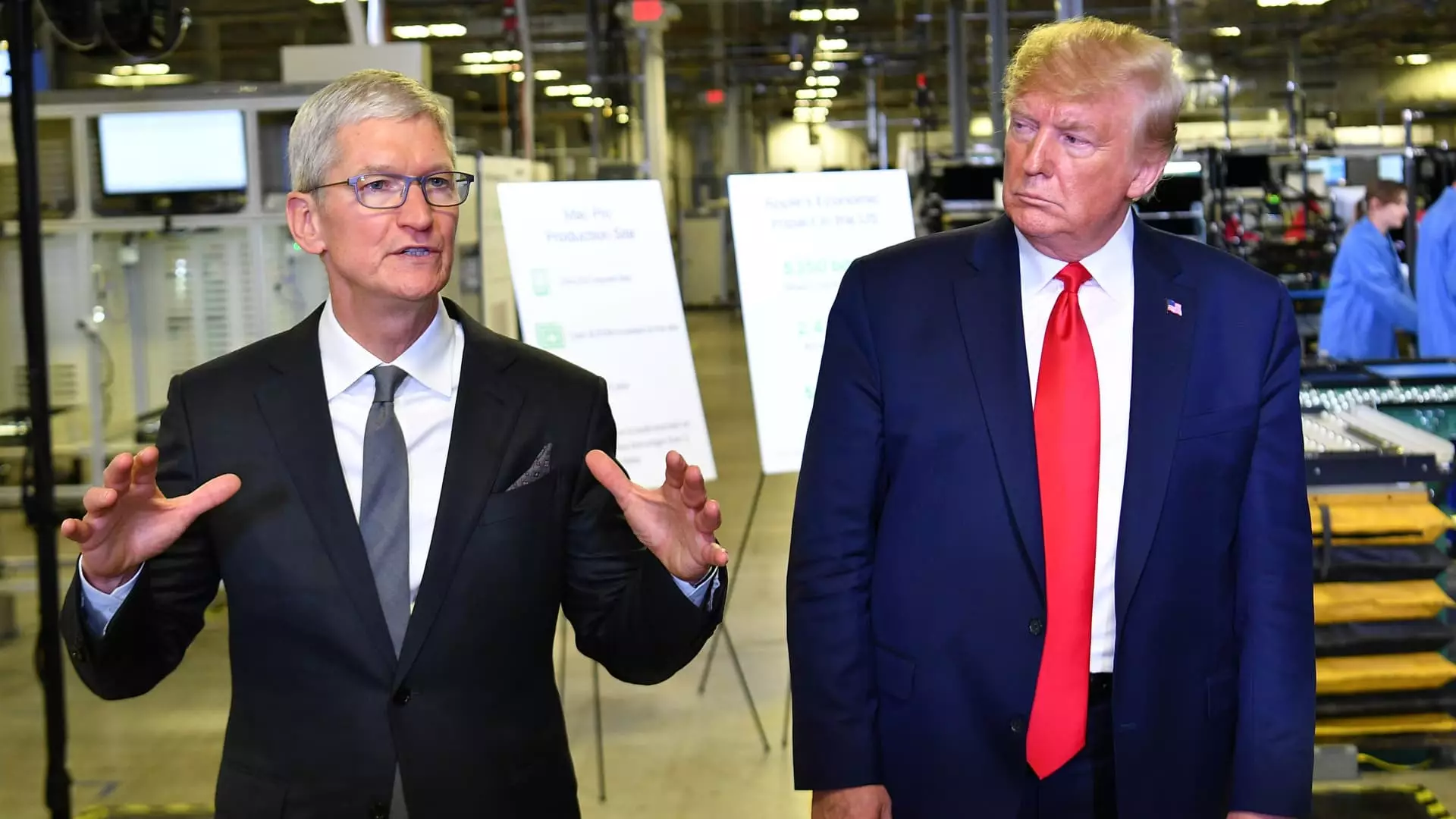The recent social media proclamations by former President Donald Trump regarding Apple and its manufacturing practices signal more than just a contentious business arrangement; they unveil the treacherous intersection of technology and politics. Trump’s assertion that Apple must start manufacturing its iPhones in the United States, or face a punitive tariff of 25%, reverberates beyond corporate boardrooms; it underscores his administration’s harsh stance on foreign trade and the critical importance of domestic production. What lies beneath this rhetoric is a manifestation of America’s tumultuous relationship with globalization and a desperate attempt to revive domestic manufacturing at any cost.
Trump’s announcement is reminiscent of his broader protectionist policies. His warning to Apple is not merely a call to arms for more American jobs; it is a politically motivated ultimatum aimed at asserting his influence over one of the most iconic companies in the world. This tactic—a mix of economic pressure and political theatrics—does little to acknowledge the complexities of modern global supply chains, yet appeals to a base that has seen factories closed and jobs moved overseas for decades. For Apple, which has predominantly relied on Chinese manufacturing, this ultimatum risks fundamentally altering its business model and pricing structures.
The Economic Ramifications: A Tough Pill to Swallow
To fully grasp the implications of Trump’s threats, it’s essential to consider the potential economic consequences. Wall Street analysts are not shy about forecasting that moving iPhone production stateside could inflate prices to staggering heights—potentially upwards of $3,500 for a device currently retailing around $1,000. This does not just challenge Apple’s consumer base, which is accustomed to premium pricing, but also risks alienating middle-class families who depend on technology that offers them an edge in the modern economy.
Moreover, the audacity of levying tariffs on a product like the iPhone is a calculated gamble. By targeting a beloved consumer product, Trump hopes to rally public sentiment against perceived injustices in American trade policy, directing consumer frustration towards Apple and catalyzing calls for change. Yet, this form of economic populism overlooks the reality that such tariffs won’t just hurt corporate profits; they will inevitably burden everyday consumers with higher prices. Higher tariffs on products that are becoming increasingly vital to daily life run the risk of backlash that could reverberate across the economy.
A Tug of War with Complexity
It is critical to analyze the motives behind Trump’s increasing pressure on Apple and its CEO, Tim Cook. Their relationship has been fraught, fluctuating between collaboration and contention. The fact that Cook famously donated to Trump’s inauguration fund does not wipe the slate clean; it now seems like a tactical misfire in hindsight. The recent announcement hints at a shift from cooperation to coercion, with Trump’s agenda becoming something of a litmus test for loyalty to America-first trade policies.
Furthermore, the expansion of Foxconn’s operations in India reflects a complicated reality—global companies are diversifying their supply chains not just for cost efficiencies but in anticipation of political backlash, both at home and abroad. Apple’s commitment to investing $500 billion in U.S. development coupled with its efforts to navigate China’s waning demand reveals the precarious tightrope the company is walking. Will it remember the lessons of the past, where tariffs made it more difficult to foster innovation and drive growth?
The Shadow of Influence: A New Era of Trade Wars
Trump’s latest rhetoric is indicative of an uptick in trade tensions that threaten to destabilize carefully negotiated agreements between nations. His simultaneous call for a 50% tariff on products from the European Union only amplifies this. The pressing need for the U.S. to secure its semiconductor supply chain puts Apple in an uncomfortable position; the emphasis on domestic production does have merit, particularly for national security, but not if pursued through coercive means.
Moreover, as Apple grapples with the complexities of navigating such turbulent waters, the reality is that the global economy does not abide by the isolationist principles that Trump espouses. The world is interconnected—any attempt to erect walls around a corporation as complex and global as Apple will likely lead to unforeseen consequences. In the end, as tariffs threaten prices and profitability, consumers might bear the fallout of a political stunt disguised as a call for patriotism.
The fragility of modern economics lies exposed, revealing that the push for “America First” might place it in a precarious position within the global marketplace. Promoting American manufacturing is undoubtedly a noble goal, but the methodology must not undermine the very foundation of what made American companies great in the first place: innovation, diversity, and the agility to adapt to a rapidly evolving global landscape.


Leave a Reply